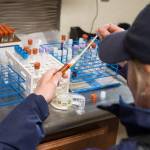Kentucky Equine Research Represented at Science Symposium

Kentucky Equine Research had a hand in multiple papers presented at this year’s Equine Science Society meeting, held virtually June 1-4, building on a strong tradition of published research.
Ashlee Hauss, a research coordinator at Kentucky Equine Research, submitted a paper titled “Effect of branched-chain amino acid and N-acetylcysteine supplementation post-exercise on muscle mTOR signaling in exercising horses,” which describes research she performed in partial fulfillment for her master’s degree at the University of Kentucky. Results from this study provide novel preliminary data on the safety of N-acetylcysteine supplementation in exercising horses in regard to metabolism regulation and protein synthesis.
Another study, “Heart rates at the trot on a mechanical walker are correlated to cardiovascular fitness in Thoroughbred racehorses,” was completed at the Kentucky Equine Research Performance Center in Ocala, Florida. Researchers found that cardiovascular fitness under saddle can be estimated from heart-rate data collected at a trot on a mechanical walker.
Other work reported at the meeting represents the continuation of a long and valued association Kentucky Equine Research has had with Stephanie Valberg, D.V.M., Ph.D., and her colleagues, including “Antioxidant, reactive oxygen species, and coenzyme Q10 concentrations and expression of electron transfer proteins in Thoroughbreds with recurrent exertional rhabdomyolysis” and “Comparison of skeletal muscle citrate synthase activity across equine breeds.” Valberg is the director of the Equine Neuromuscular Diagnostic Laboratory and Mary Anne McPhail Dressage Chair in Equine Sports Medicine at Michigan State University, Department of Large Animal Clinical Sciences. An early collaboration between Kentucky Equine Research and Valberg resulted in the development of Re-Leve, the first low-starch feed formulated for horses.
The final study, “Race training improves skeletal muscle mitochondrial volume density, function, and capacity in Thoroughbreds,” involved a collaboration with researchers from Texas A&M University. This study represents the first report of mitochondrial adaptations to early race training, which may assist in developing precision management programs to enhance performance and well-being of elite racehorses.
The Equine Science Society promotes quality research in many fields of study and establishes effective communication among researchers, teachers, extension, and production personnel. The society’s signature event is its biennial symposium, which features professionals and students from multiple countries, many of whom report the latest scientific advances. Kentucky Equine Research has contributed to nearly every symposium since it opened more than 30 years ago.








